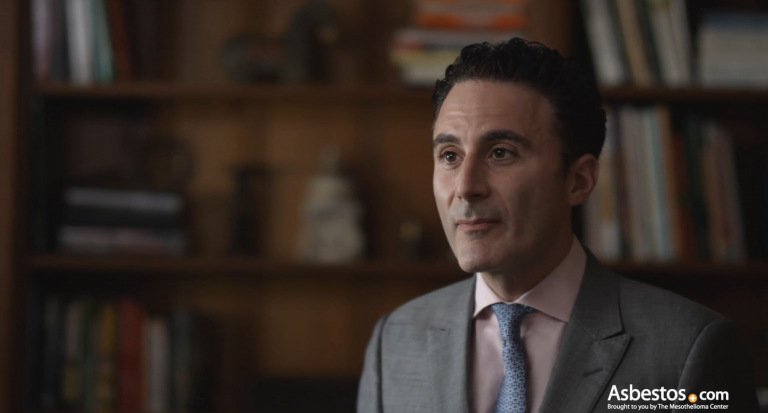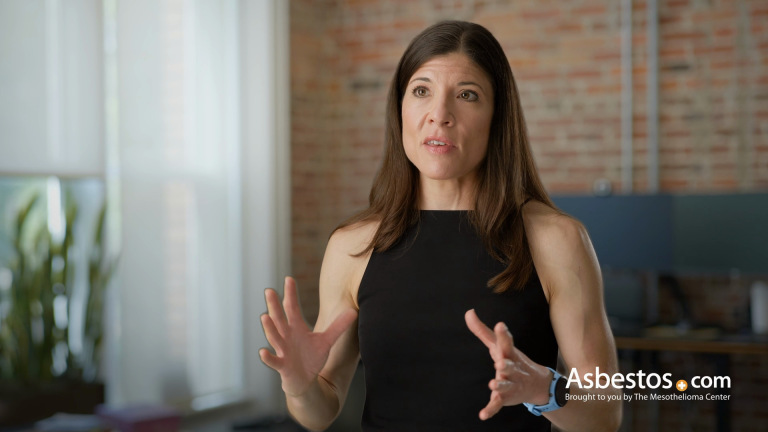Questions for Your Doctor
Hearing that you have mesothelioma will trigger a lot questions. A knowledgeable oncologist can answer most of them. If not, you can get a referral to someone who can. Don't be afraid to ask questions.
Questions to Ask About Mesothelioma
As a new cancer patient, you’ll need to know a great deal about how the diagnosis will impact your body, life and family. Ask questions about which type of mesothelioma you have, its stage and how it will affect your body. This information empowers you to make informed decisions about your treatment.
Talk to your doctor about long-term follow-up care and what you can do at home to promote recovery. Understanding how the cancer may progress over time helps you anticipate what to expect and how to prepare for the future. Inquire about managing potential side effects and treatment complications to improve your quality of life during treatment.
If your oncologist can’t answer certain questions, keep asking different medical professionals for guidance. There are many facets to dealing with asbestos-related cancer and learning about them can feel overwhelming. Consider joining a mesothelioma support group where you can build a supportive community, one that can provide great information without having to get a doctor’s appointment or wait for a returned phone call.
Questions About Your Diagnosis
Asking your oncologist questions about your diagnosis can help you understand more about your specific type of mesothelioma. Mesothelioma can occur in different areas of the body, and the treatment options can vary depending on the stage of the disease.
Make sure to ask how your diagnosis and personal health factors influence your prognosis. Learning more about your prognosis can help your family plan for potential health care needs, such as taking time off work to help you recover or hiring a home health aide.
What type of mesothelioma do I have?
Your doctor can tell you your type, which describes the location from which the cancer originated. There are three main types of mesothelioma: pleural, pericardial and peritoneal. Mesothelioma can also develop in the lining of the testicles, although it is extremely rare.
How advanced is my cancer?
Doctors can provide you with information about the stage of your cancer, which describes exactly how far it has progressed throughout your body. Most cases of this disease are not diagnosed until an advanced stage like Stage III or IV.
What are my chances of survival?
After determining the stage of the cancer, doctors can make a prognosis that predicts the course of the disease and how it will affect your survival. Although some patients are afraid to ask about prognosis or would rather not know, knowing your prognosis may help you better understand your disease and allow you to properly plan for the future.
While the prognosis for most patients is generally a year or less, new and improved treatments are extending the life expectancy of patients worldwide. It is important to understand that every cancer patient is different. Although a prognosis can be helpful, it may not accurately predict your survival.
Understand, though, that most doctors have difficulty giving patients an exact time frame. Life expectancy does vary from patient to patient, but the typical range is between four and 18 months.
Will I need additional tests before deciding on treatment?
Sometimes, your doctor will need to perform other tests to determine if you qualify for a treatment option. Be sure to ask your doctor if additional tests like imaging scans or blood tests are needed, and if so, what these tests entail.
Patients often ask, “What will be my quality of life after surgery? What is the difference between immunotherapy and chemotherapy? Why would a doctor recommend chemo or immunotherapy over surgery?” Patients are surprised by the way we explain the disease and treatments to help them better understand things compared to the 5 minutes their doctor took with them.

Questions About Treatment Options
Inquiring about how mesothelioma is treated can help you understand why certain therapies work for different types and stages. For example, mesothelioma tumors tend to grow in the form of many nodules rather than a single tumor mass. This makes surgery for mesothelioma a long and complex procedure that works best in the early stages.
Mesothelioma treatment can include surgery, chemotherapy, radiation, or a combination of these. Asking about the benefits, risks, and potential outcomes of each option allows you to choose a plan that aligns with your health goals and quality of life.
How much experience do you have treating mesothelioma?
Because mesothelioma is a rare cancer, your doctor may not have much experience treating it. You should ask your doctor how many mesothelioma patients he or she has treated and what therapies he or she has performed. If you would prefer to be treated by a more experienced physician, ask if your doctor can recommend a specialist.
What are my treatment options?
Every case is different. A team of oncologists well-versed in the treatment of mesothelioma will collaborate to develop the best possible plan for you. The most common course of treatment involves some combination of surgery, chemotherapy and radiation therapy.
Newer therapies, such as immunotherapy, are also on the way to becoming the new standard. A January 2022 study suggests that dual immunotherapy checkpoint inhibitors may soon be a new preferred frontline regimen for some malignant pleural mesothelioma patients.
The appropriate treatment options are largely influenced by the stage of your cancer and your overall health. Be sure to ask your doctor about all available treatment options.

What is the goal of treatment?
For each therapy your doctor suggests, you should ask about the goal of that treatment. Some treatments are palliative, meaning they aim to manage painful symptoms and improve your quality of life. These treatments do not attempt to cure the cancer. Before agreeing to undergo any treatment, be sure that you fully understand its purpose.
Will treatment make me feel sicker than I already feel?
Symptoms may make you feel weak and uncomfortable, and a number of treatments can help address these symptoms. While the procedures can help alleviate the discomfort caused by the cancer, they may cause their own side effects.
For example, surgery can remove part of the tumor, in turn reducing the pressure a patient feels on his or her chest, but the risks involve soreness at the incision site, bleeding and infection. Chemotherapy, which helps the body destroy the tumor, may make you feel weak or nauseated. For most of these side effects, doctors can provide medications to counteract the pain, but you may still experience adverse reactions.
Do I have to accept all of the treatments that are suggested?
No. This is your body, and you get to decide on your treatment. Choosing a medical team to handle your treatment does not strip you of your power to make decisions. If your doctor suggests a treatment that you are uncomfortable with, you do not need to accept it.
In his book, “They Said Months, I Chose Years,” survivor J.R. O’Connor explains that he believes “everyone has to find their own path when facing a terminal disease … [and] possess the faith and confidence to make the right treatment decisions.”
How about alternative or more natural treatments for these diseases?
More and more doctors are recognizing the advantages of complementary and alternative treatments for cancer. These treatments, often offered alongside traditional cancer therapies, may include natural medicines or therapies like meditation, acupuncture, massage and hypnosis. If your doctor does not recommend alternative treatments, you may want to research them on your own. Be sure to talk to your doctor before trying any additional treatments.
Can I continue with my everyday routine after treatment?
Some patients can continue working and performing everyday duties and activities throughout treatment. However, certain treatments can greatly affect your well-being and quality of life. Before starting any treatment, you should talk to your doctor about how the recovery process will affect your daily routine.
Questions About Supportive Resources
Using cancer support resources can improve your well-being and ability to cope with the challenges of mesothelioma. A mesothelioma diagnosis can feel emotionally overwhelming to you and your loved ones. Resources like counseling and support groups can help your family manage stress, anxiety, depression and grief.
Ask your cancer center about financial aid, such as travel and treatment grants. Local organizations and churches may offer cancer support services as well. Lawyers can help families access mesothelioma compensation and create medical health directives, wills, and power of attorney documents.
Are there programs available to help cover my medical bills?
Even if your insurance policy is limiting, you may be able to obtain authorization to see a specialist out of network. If you have to travel to a far-away facility, you may be eligible for a travel grant and lodging discounts. You may be able to secure an override so that you can get the full range of care that you need. For help with this process, e-mail our Patient Advocates.
Should I get a lawyer?
If you or a loved one was diagnosed with mesothelioma, you should consider looking for an attorney. Lawyers who represent people with an asbestos-related disease work on a fee basis, which means you will not have to pay for an attorney until you collect money from a verdict, a settlement or an asbestos trust fund claim.
Once you’re diagnosed with mesothelioma, you’re probably going to get different lawyers contacting you. Choose a lawyer who specializes in mesothelioma cases and is the best one for you. Filing a claim is a way for us to seek justice.
Why would you need an attorney? Because your disease more than likely stemmed from you being exposed to asbestos. This means your illness was entirely preventable, and you have a right to be compensated for any negligence involved.

Get help finding a top attorney who can get you the compensation you deserve.
Get Help NowHow do I break the news to my family that I have cancer?
Share the news of your diagnosis when you are ready. Remember that your family may be your best source of support.
Telling loved ones about this disease can be emotional and scary. You may need to handle each conversation in a different way. Children should be reassured that they did not cause your cancer, while older kids may angrily ask “Why?” Private, candid conversations should be held with your spouse, parents or close friends whom you wish to include.
When you are ready to share the news, decide which details you wish to share, and do not feel pressured to discuss anything that makes you uncomfortable. And don’t worry about hurting your loved ones. They often will be your biggest source of support.
Where can I go for help with the emotional challenges of cancer?
At this point in your journey, you may be experiencing a number of emotions related to your diagnosis, such as fear, anxiety or sadness. Depression is not uncommon in cancer patients. You may benefit from joining a support group to find comfort.
You may feel empowered and comforted by contributing to advocacy and awareness events. Even while receiving treatment, many patients can attend symposiums, conferences and fundraisers to connect with others in the community, learn about the breaking news in the field of mesothelioma, and help bring public awareness to this cancer.
Many patients diagnosed with cancer may feel overwhelmed or depressed. If you need help dealing with the emotional challenges of your cancer, ask your doctor to recommend a mental health professional.
Recommended Reading






